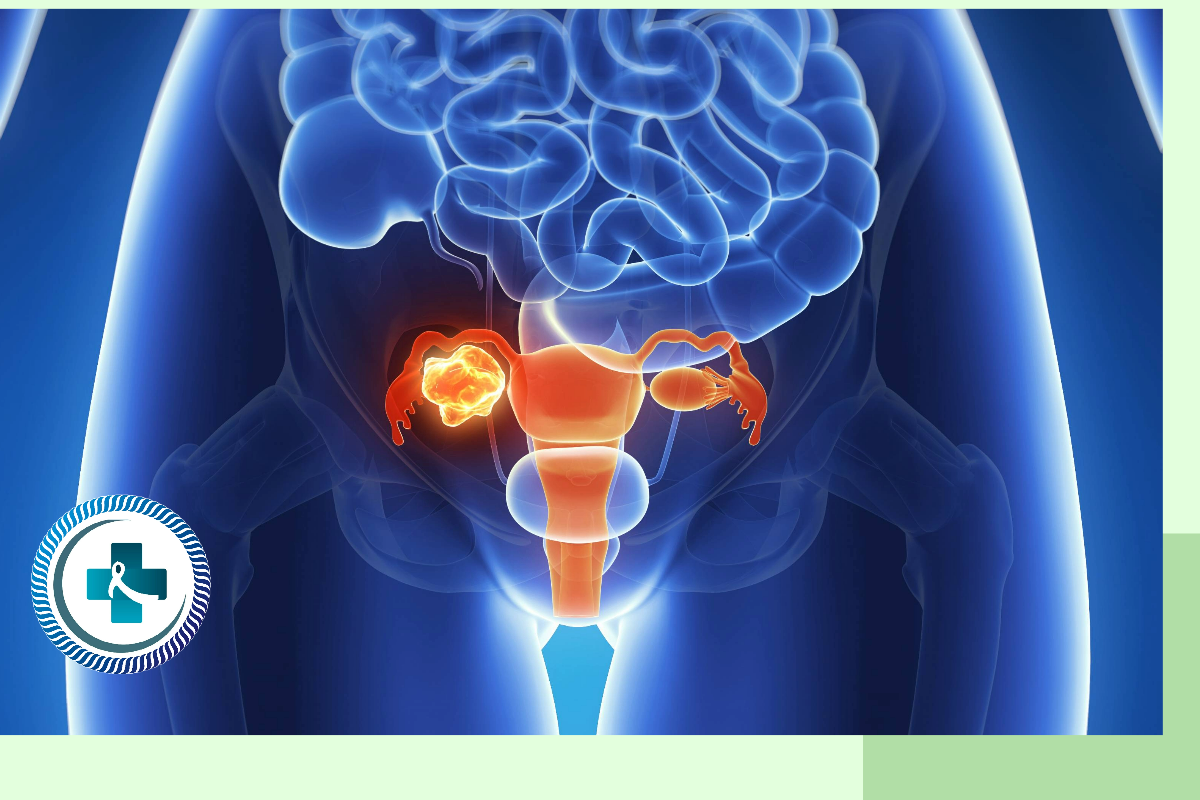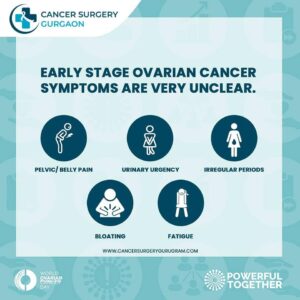
Ovarian cancer is the cancer which arise from reproductive organs of female. Ovaries are female organs of reproduction, two in number and situated on either sides of uterus. Ovaries produce eggs and female hormones. Eggs are produced in ovaries, travel in fallopian tubes and reach uterus for fertilization. Ovaries are main sources of estrogen and progesterone hormones. Apart from ovaries, epithelial cancers can also arise from fallopian tubes and peritoneum. Ovarian cancer can arise in one ovary, both ovaries or it can present with other organs spread.
Types
Epithelial Ovarian Cancer: most common type (>90%) and starts in the cells that cover the ovary’s surface. Subtypes of epithelial ovarian cancer include serous, mucinous, endometrioid, and clear cell carcinomas.
Germ Cell Tumors: These tumors start in the cells that produce eggs and are more common in younger women. Examples include teratomas, dysgerminomas, and yolk sac tumors. most common types of ovarian tumor in children.
Stromal Cell Tumors: These tumors develop in the cells that produce hormones in the ovaries. They can lead to hormonal imbalances. Examples include granulosa cell tumors and Sertoli-Leydig cell tumors.
Risk Factors
Age: The risk of ovarian cancer increases with age, especially after menopause.
Family history: Women who have a close relative (mother, sister, or daughter) with ovarian cancer have a higher risk of developing it themselves. This may be due to inherited genetic mutations, such as BRCA1 or BRCA2, that increase the risk of both ovarian and breast cancer.
Personal history: Women who have had breast, uterine, or colorectal cancer may have a higher risk of ovarian cancer. Also, women who have never been pregnant or who had their first pregnancy after age 35 may have a higher risk.
Hormone therapy: Women who use hormone replacement therapy (HRT) after menopause may have a slightly increased risk of ovarian cancer. The risk may depend on the type, dose, and duration of HRT.
Reproductive History: Factors that affect the number of times a woman ovulates over her lifetime can influence ovarian cancer risk. These include:
- Nulliparity: Women who have never given birth have a slightly higher risk.
- Late Pregnancy: Women who have their first full-term pregnancy after the age of 35 have a slightly higher risk.
- Early Menstruation and Late Menopause: Starting menstruation at an early age (before age 12) or undergoing menopause after age 50 can increase the risk.
Obesity: Women who are obese (body mass index of 30 or higher) may have a higher risk of ovarian cancer.
Lifestyle factors: Smoking, alcohol consumption, and diet high in saturated fats may also affect the risk of ovarian cancer.
Screening for Ovarian Cancer:
There is no universally recommended screening test for ovarian cancer that is effective in detecting the disease at an early stage for the general population. Ovarian cancer often presents with vague symptoms and is usually diagnosed at an advanced stage, which makes it challenging to screen for effectively. However, there are a couple of tests that have been used for certain high-risk groups or under specific circumstances:
- Tumor Markers Blood Test: S. CA-125: CA-125 is a protein that can be elevated in the blood of some women with ovarian cancer. While the CA-125 blood test is sometimes used, it’s not very specific to ovarian cancer and can be elevated in other conditions such as endometriosis or pelvic inflammatory disease. Therefore, it’s not recommended as a general screening test due to the risk of false positives and false negatives.
- Ultrasound: obtain images of the ovaries. This test is occasionally used for screening in high-risk women, such as those with a family history of ovarian cancer or known genetic mutations. However, it also has limitations in terms of sensitivity and specificity.
.
Alarmimg Signs/ Symptoms of Ovarian Cancer
Historically ovarian cancer is called as ‘Silent Killer’ because early symptoms of ovarian cancer can be subtle and easily confused with other less serious conditions. Only 20% of women are detected in early stages. So it is very important to be aware of this hidden enemy and even the mild symptom should not be ignored.
- Abdominal or Pelvic Pain: Persistent pain or discomfort in the abdominal or pelvic area.
- Bloating: A feeling of fullness or bloating that doesn’t improve with time.
- Change in Bowel Habits: Changes in bowel habits, such as constipation or diarrhea, that persist.
- Frequent Urination: Needing to urinate more often than usual, even if only small amounts.
- Loss of Appetite or Feeling Full Quickly: A reduced appetite or feeling full quickly when eating.
- Fatigue: Unexplained fatigue or low energy levels.
- Unexplained Weight Loss: Losing weight without making any changes in diet or exercise.
- Back Pain: Pain in the lower back that doesn’t seem related to a specific injury.
- Changes in Menstrual Cycle: Irregular menstrual cycles or changes in menstrual bleeding.
Investigations
Blood Tests:
– CA-125: This is a tumor marker often elevated in cases of ovarian cancer; however, it can also be elevated in benign conditions and can be normal in early stage cancer.
– HE4 (Human Epididymis Protein 4): Like CA-125, HE4 is a tumor marker that can be elevated in ovarian cancer.
- Imaging:
Ultrasound: usually initial investigation.
CT Scan (Computed Tomography): helps to assess the size and extent of tumor.
MRI (Magnetic Resonance Imaging)
PETT-CT (Positron Emission Tomography – Computed Tomography): help to determine whether cancer has spread to other parts of the body.
- Genetic testing may be advised in view of history details.
Treatment
Surgery: Surgery is main treatment for most of treatable ovarian cancers. Surgery has two important roles of proper staging and Cytoreduction. Optimal removal of all visible disease and potential areas where disease can spread, is the best possible chance of cure and long-term control. The extent of surgery depends on how far the cancer has spread and whether it can be safely removed without damaging vital organs.
- Primary Cytoreductive Surgery: Surgery to remove maximum possible extent of tumor. Earlier also called as debulking surgery. Removes both ovaries, uterus, omentum, abdominal lymph nodes and other visible sites of disease like peritoneum.
- Fertility Sparing Surgery: For early-stage and low grade cancer that hasn’t spread beyond one ovary, surgery may involve removing the affected ovary and its fallopian tube. This procedure may preserve the patient’s ability to have children using the remaining ovary and uterus.
- Cytoreductive Surgery + Hyperthemic Intraperitoneal Chemotherapy (HIPEC): If the cancer is advanced, the surgical oncologist perform surgery to remove as much of the cancer as possible. After this chemotherapy drugs may be heated and infused into the abdomen during surgery (hyperthermic intraperitoneal chemotherapy or HIPEC). The drugs are left in place for a certain amount of time before they’re drained. Then the operation is completed.
Role of minimal invasive surgery either laparoscopy or robotic is less clear and open surgery is still preferred approach in case of ovarian cancer treatment.
Sometimes surgery is also required for palliation as in case of bowel obstruction in advance disease.
To Book Appointment for Cancer Surgery :
Integration of Multimodality Treatment
- Chemotherapy: drug that can kill fast-growing cancer cells in the body. Chemotherapy is often used after surgery to kill any cancer cells that might remain. It can also be used before surgery to shrink tumors and make them easier to remove.
- Targeted therapy: type of drug treatment that focuses on specific weaknesses present within cancer cells. By attacking these receptors targeted therapy can cause cancer cells to die or stop growing. Targeted therapy may be used alone or in combination with chemotherapy for ovarian cancer. These drugs include bevacizumab, olaparib, rucaparib.
- Hormone therapy: Some ovarian cancer cells use estrogen to help them grow, so blocking estrogen may help control the cancer. Hormone therapy might be a treatment option for some types of slow-growing ovarian cancers.
- Immunotherapy: Immunotherapy is a type of treatment that uses the immune system to fight cancer. The body’s disease-fighting immune system may not attack cancer cells because they produce proteins that help them hide from the immune system cells. Immunotherapy works by interfering with that process. Immunotherapy might be an option for treating ovarian cancer in certain situations. For example, some patients with advanced ovarian cancer may benefit from a type of immunotherapy called checkpoint inhibitors, which block proteins that prevent the immune system from attacking cancer cells. Checkpoint inhibitors that are approved for ovarian cancer include pembrolizumab and nivolumab.
Ovarian cancer is a serious condition that requires prompt diagnosis and treatment. The treatment options for ovarian cancer depend on various factors, such as the stage, type and grade of the cancer, as well as the patient’s age, general health and preferences. The main treatments for ovarian cancer are surgery and chemotherapy.
Got some questions
If a patient report any of the following symptoms that are:
- new to the patient within the past year and
- occur more than 12 times per month
Ø1) Pelvic or abdominal pain
Ø2) Increased abdominal size or abdominal bloating
Ø3) Difficulty eating or feeling full quickly
Contact Cancer Surgery clinic Arogyam Care at Gurugram, Delhi NCR or book online appointment for ovarian cancer treatment in Gurgaon.
- If all relavant examination and investigations has been done than plan of treatment is finalized with colon cancer surgeon
- After deciding surgical procedure cost estimate can be taken from billing department or hospital. Clinic or hospital department coordinator will assist in case any help required. +918750587489,
- you can visit nearby hospital for colonoscopy screening as advised in our screening section or you can read various society guidelines like American cancer society, USPTF.
- You can consult us through our online consultation link. https://api.whatsapp.com/send/?phone=918750587489&text=I+am+Looking+for+an+appointment+with+Dr.+Kaushal+Yadav.+Please+Help&type=phone_number&app_absent=0
Best Doctor for ovarian cancer in Gurgaon says that 5 year survival for stage I is 95%, II is 80-90%, stage III is 70% and IV is 30%. The overall 5-year survival rate for people with ovarian cancer is 50%.

